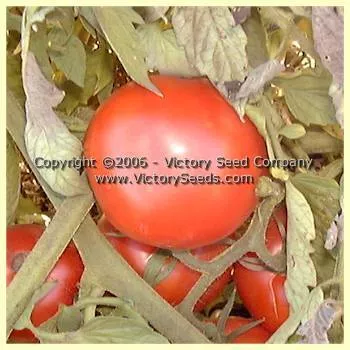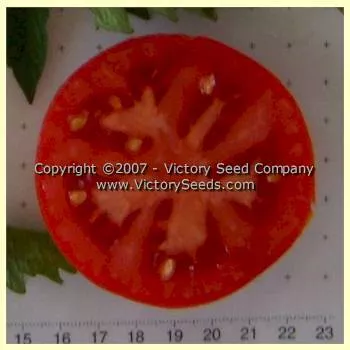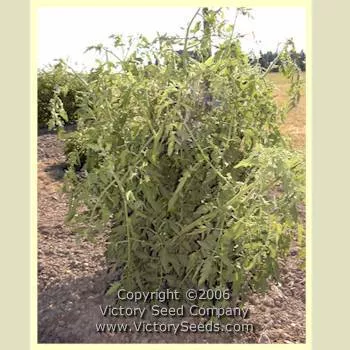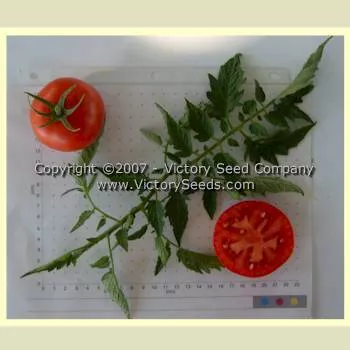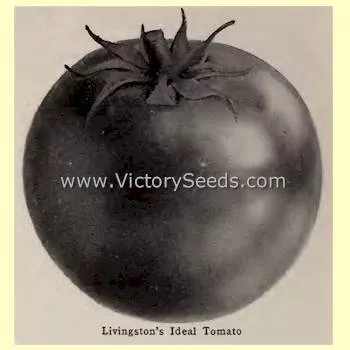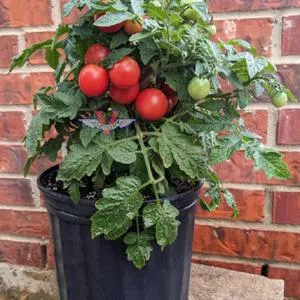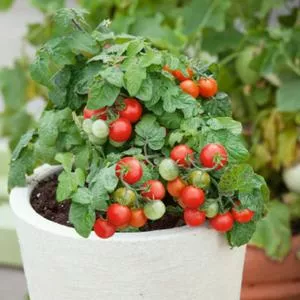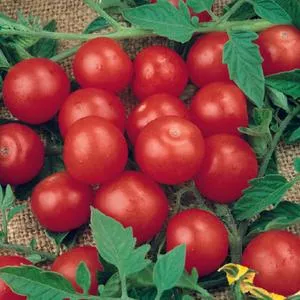




Livingston's Ideal Tomato
Solanum lycopersicum
Price: $3.45
SKU: 3402081VERY IMPORTANT NOTE: This variety will be available again early next January. Please signup below to be notified when it becomes available. Click here to learn more about our seasonal products.
75 days, indeterminate - Originally bred to perform well for market growers wishing to force an early crop of tomatoes "under glass" (in a greenhouse), Livingston's 'Ideal' does equally well in the garden or open field. Its regular leaf plants are strong and sturdy with good leaf coverage. They are indeterminate in nature so do require staking or caging. The fruit are red in color, average six to eight ounces each, are globe-shaped and quite tasty.
Originally introduced to gardeners by the Livingston Seed Company in 1930, here is how they described it in their seed catalog for that year:
When the Victory Seed Company began the work of reassembling the Livingston Tomato Collection in the early 2000s, most of the varieties were no longer being grown or offered commercially. Some seed companies were selling seeds as Livingston varieties but when grown, all were discovered to be incorrect. And with a few exceptions, this was our experience with growing out seed obtained from seed savers.
Thankfully, back in the 1990s and early 2000s, the National Seed Storage Lab in Ft. Collins, Colorado (since renamed the National Center for Genetic Resources Preservation or NCGRP) was a diligent protector of our Nation's horticultural heritage.
Explaining our mission to them, we were able to obtain many samples. Since our work reintroducing rare varieties that were no longer commercially available ultimately helped to lighten their sample request workload coming from the general public, they appreciated what we were doing. When possible, they even would send us samples of varieties that were in the database but listed as not available due to poor germination rates.
In 2002, along with many other samples, we received NSL 27040, Livingston's 'Ideal'. It was listed in the database with a provenance tracing directly back to Livingston in 1939.
We obtained a sample but the seed was appeared old and proved to be extremely "tired." That first year, we got four seeds to germinate, two died at the seedling stage, another was a mutation with no terminal bud, and the fourth only grew a few inches tall by the middle of the growing season and never produced fruit.
Since this accession, out of the half-dozen other "Ideal" samples we had tried, promised to be the true Livingston variety, we didn't give up. Out of the original NSSL seed sample, we eventually got one healthy plant to produce fruit. It accurately matched primary source historical records and over a period of several growing seasons, we verified its stability and increased the available seed stock. We finally re-introducing it to the gardening public in 2008.
Fast forward to 2017 . . . While doing research for an article in April of 2017, I again revisited the USDA's database and was shocked to learn that Livingston's 'Ideal' had been dropped! Technically, Livingston's 'Ideal' (accession number NSL 27040) is listed as being "no longer available" and declares that it was simply a duplicate accession to PI 347453 and PI 645080. Sadly, this is incorrect.
PI 645080 is listed under a completely different name, 'Ideal Forcing', and viewing the associated USDA grow out image, it does not look like Livingston's 'Ideal'.
PI 647453, listed simply as 'Ideal' with no documented connection to the Livingston Seed Company, was donated into the USDA's collection on 18-Dec-1990 from Bulgaria. We actually grew out this accession in 2003 and it was clearly not Livingston's 'Ideal'. Along with the appropriately sized and shaped fruit, it also produced larger, beefsteak-sized fruit.
For whatever reasons, presumably due to lack of proper funding, the collection within the National Plant Germplasm System database is being systematically de-accessed at a concerning rate and "synonyms" consolidated into one accession. Granted, I am sure that there are actual cases of duplicate samples, but Livingston's 'Ideal' is a case that clearly illustrates an incorrect decision and a potential for profound loss.
So there you have it. In my opinion the wrong accession was discarded. Perhaps the decision to consolidate accessions was based in part on the similar cultivar names and the poor germination of NSL 27040 probably weighed into the decision. But the result is the same; Livingston's 'Ideal' (NSL 27040), is now only being maintained outside of the protection of the NCGRP, here at the Victory Seed Company, soon in the seed bank of the Seed Savers Exchange, and hopefully in your garden.
Originally introduced to gardeners by the Livingston Seed Company in 1930, here is how they described it in their seed catalog for that year:
"For the past five years we have been working on this new variety, having in mind the development of certain qualities which go to make up an ideal greenhouse Tomato and also one which would do equally well outside. We are now pleased to offer to our customers, for their approval, Livingston's Ideal, which we feel sure will very quickly become one of the leading standard varieties. It has a strong, healthy plant and shows no signs of blight. The globe-shaped fruit is of medium size, bright scarlet with firm flesh and about same season as Bonny Best. Fruit clusters set closely on stalk, thus increasing the yield under glass. Because of the very uniform size and shape of Ideal, we believe it should serve exceptionally well for green wrapping."
The original source for our seed was from the National Seed Storage Lab's accession number NSL 27040. Now quite rare, you can learn more about their near extinction in the article below.
A Precautionary Tale:
The Precarious Future of Plant Cultivars
by Mike Dunton
Livingston's 'Ideal' tomato is a good example of how a plant variety's future can be presumed to be secure for future generations to enjoy, when in fact, by the stroke of a pen or an administrative decision, it can easily turn into a historical footnote.The Precarious Future of Plant Cultivars
by Mike Dunton
When the Victory Seed Company began the work of reassembling the Livingston Tomato Collection in the early 2000s, most of the varieties were no longer being grown or offered commercially. Some seed companies were selling seeds as Livingston varieties but when grown, all were discovered to be incorrect. And with a few exceptions, this was our experience with growing out seed obtained from seed savers.
Thankfully, back in the 1990s and early 2000s, the National Seed Storage Lab in Ft. Collins, Colorado (since renamed the National Center for Genetic Resources Preservation or NCGRP) was a diligent protector of our Nation's horticultural heritage.
Explaining our mission to them, we were able to obtain many samples. Since our work reintroducing rare varieties that were no longer commercially available ultimately helped to lighten their sample request workload coming from the general public, they appreciated what we were doing. When possible, they even would send us samples of varieties that were in the database but listed as not available due to poor germination rates.
In 2002, along with many other samples, we received NSL 27040, Livingston's 'Ideal'. It was listed in the database with a provenance tracing directly back to Livingston in 1939.
We obtained a sample but the seed was appeared old and proved to be extremely "tired." That first year, we got four seeds to germinate, two died at the seedling stage, another was a mutation with no terminal bud, and the fourth only grew a few inches tall by the middle of the growing season and never produced fruit.
Since this accession, out of the half-dozen other "Ideal" samples we had tried, promised to be the true Livingston variety, we didn't give up. Out of the original NSSL seed sample, we eventually got one healthy plant to produce fruit. It accurately matched primary source historical records and over a period of several growing seasons, we verified its stability and increased the available seed stock. We finally re-introducing it to the gardening public in 2008.
Fast forward to 2017 . . . While doing research for an article in April of 2017, I again revisited the USDA's database and was shocked to learn that Livingston's 'Ideal' had been dropped! Technically, Livingston's 'Ideal' (accession number NSL 27040) is listed as being "no longer available" and declares that it was simply a duplicate accession to PI 347453 and PI 645080. Sadly, this is incorrect.
PI 645080 is listed under a completely different name, 'Ideal Forcing', and viewing the associated USDA grow out image, it does not look like Livingston's 'Ideal'.
PI 647453, listed simply as 'Ideal' with no documented connection to the Livingston Seed Company, was donated into the USDA's collection on 18-Dec-1990 from Bulgaria. We actually grew out this accession in 2003 and it was clearly not Livingston's 'Ideal'. Along with the appropriately sized and shaped fruit, it also produced larger, beefsteak-sized fruit.
For whatever reasons, presumably due to lack of proper funding, the collection within the National Plant Germplasm System database is being systematically de-accessed at a concerning rate and "synonyms" consolidated into one accession. Granted, I am sure that there are actual cases of duplicate samples, but Livingston's 'Ideal' is a case that clearly illustrates an incorrect decision and a potential for profound loss.
So there you have it. In my opinion the wrong accession was discarded. Perhaps the decision to consolidate accessions was based in part on the similar cultivar names and the poor germination of NSL 27040 probably weighed into the decision. But the result is the same; Livingston's 'Ideal' (NSL 27040), is now only being maintained outside of the protection of the NCGRP, here at the Victory Seed Company, soon in the seed bank of the Seed Savers Exchange, and hopefully in your garden.
Color: Red
Special Groups: Livingston Tomatoes
Harvest Timing: Main Crop / Mid-Season
Genetic Classification: Open Pollinated
Special Groups: Livingston Tomatoes
Harvest Timing: Main Crop / Mid-Season
Genetic Classification: Open Pollinated
Sow seeds indoors (do not direct sow into the garden), using sterile seed starting mix, 6 to 8 weeks before your last expected frost date. Plant 1/4" deep, water lightly but keep moist until emergence.
Full light and cooler temps (60° to 70°) will help to prevent the seedlings from becoming too leggy. If plants become rootbound before you can safely set them into the ground, transplant them into larger pots.
Harden off plants before planting outside. Young plants are very susceptible to frost and sunburn damage. Avoid too much nitrogen. Water evenly but not in excess.
Click here to view our full tomato growing guide.
Full light and cooler temps (60° to 70°) will help to prevent the seedlings from becoming too leggy. If plants become rootbound before you can safely set them into the ground, transplant them into larger pots.
Harden off plants before planting outside. Young plants are very susceptible to frost and sunburn damage. Avoid too much nitrogen. Water evenly but not in excess.
Click here to view our full tomato growing guide.
Although the name of this variety contains a modern company's name, the seed we are offering is in no way sourced from, "owned by" or connected with that company. The name is simply the historically accurate, common name for the variety giving credit to the seedsman that originally released it.
Customer Reviews:
Do you have experience with this one? 📝 📣 Write a review!
No reviews have been posted yet.

